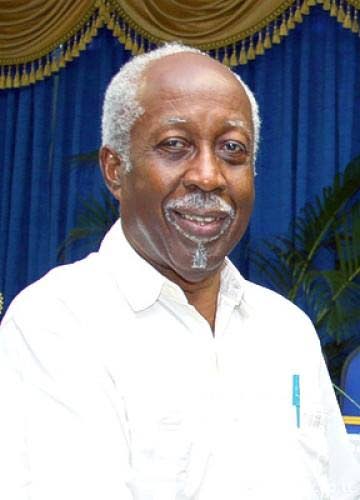The politician’s comments

Reginald Dumas
IN 1995 Patrick Manning called for the removal of service commissions. They were, he fumed (and some of us knew why he was fuming), a colonial imposition which had outlived its usefulness.
Last May, nearly three decades later, Keith Rowley advocated the replacement of the commissions by a tribunal; legislation to that effect, he said, would be introduced next year. I await this with great interest.
Startling as those prime ministerial statements may have been, I must confess I was totally taken aback by the recent reported comment from the THA Secretary for Tourism, Tashia Burris, that the public service itself should be abolished.
She was clear: “I’m not saying fire all the public servants…I am saying abolish…The Public Service was created way back when, when there was no technology around, and now what you’re trying to do is retrofit (it) to be responsive to the evolving needs of society and be responsive to the evolving situation when it comes to public administration…When you look at how the public service is, it is almost like an unreal animal, and we’re trying to cut it and contrive it to fit into new realities.”
And replace the abolished public service with what, if anything? She said: “The reality is, in the Tobago space maybe what we require is a service that is able to evolve (sic) the ever-changing needs of the administration.” So there would be a service after all? But what kind? One that is more technologically endowed? How to achieve that in the shortest time? And is technology all that counts?
To what administration was she referring when she spoke about the “needs of the administration” as apparently distinct from the “needs of (the Tobago) society?” Public administration? The THA political directorate? Whichever, does she consider those needs more, or less, important than those of the society as a whole, since they all, it seems, are either “evolving” or “ever-changing?”
I know of no country in the world without a public/civil service (I suppose someone will now say that Tobago isn’t a country). But I think it would be fair to Secretary Burris to wait until she develops her ideas and makes them public. Then there could be a serious open discussion.
I next read that the daughter of a THA secretary – I call no names – had been involved in school violence, an increasingly worrying phenomenon in TT. I read further that the secretary concerned rebuked a reporter who reached her on the matter: it was none of the reporter’s business, and that “the only thing the media should be speaking to me about is my public life and my political career and the work that I do as a public servant.” (Does this reference to “public servant” suggest another kind of public service? Should that, too, be abolished?)
I try to be polite, and I shall therefore confine myself to describing the secretary’s response as bewildering. Was a politician really instructing a reporter, in a society said to be democratic, on what questions she should or should not pose? And when have politicians, again in democratic societies, usually been able to draw a no-cross media line between their public and private lives? (As US president, Bill Clinton didn’t bear that constantly in mind.)
Shabba De Leon’s letter in the Express was an analytical reaction to the secretary’s remarks. If I were the secretary, I would pay close attention to it. For myself, I was reminded of a Newsday article I wrote just over one year ago.
I said: “One characteristic generally emerges: the attitudinal change, usually rapid, in many of those who receive high, or important, political preferment. A distance between them and the people whose votes they sought now appears and is preserved…They condescend and are insensitive…
“Vocabulary changes: they no longer ‘ask’ or ‘request,’ they now ‘instruct’ or ‘direct.’ They are in control, in charge. They blame their public officers for their own shortfalls or failures. Position and title overwhelm; the ‘do-you-know-who-I-am’ syndrome asserts itself…
“Hubris isn’t new, of course, or peculiar to TT. In Shakespeare’s Julius Caesar, Brutus is musing on Caesar’s increasing pomposity. He doesn’t dislike Caesar, but he worries that the latter’s growing self-importance and power could pose a threat to the health of the Roman republic…
“He says: ‘But ’tis a common proof/That lowliness is young ambition’s ladder/Whereto the climber upward turns his face;/But when he once attains the upmost round/He then unto the ladder turns his back/Looks into the clouds, scorning the base degrees/By which he did ascend…’
“Shakespeare wrote those words in 1599 or 1600. Nearly 425 years later, tell me what is different.”


Comments
"The politician’s comments"